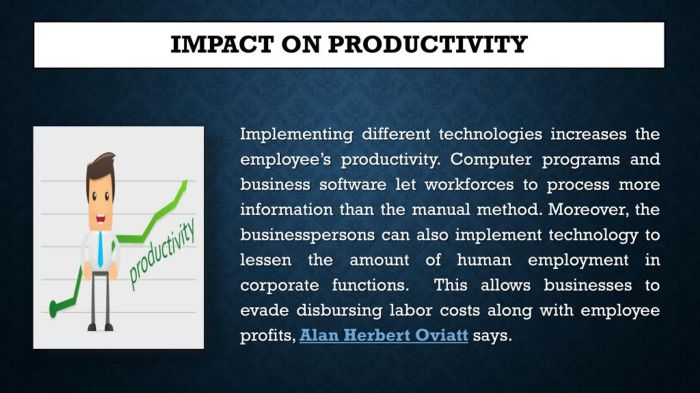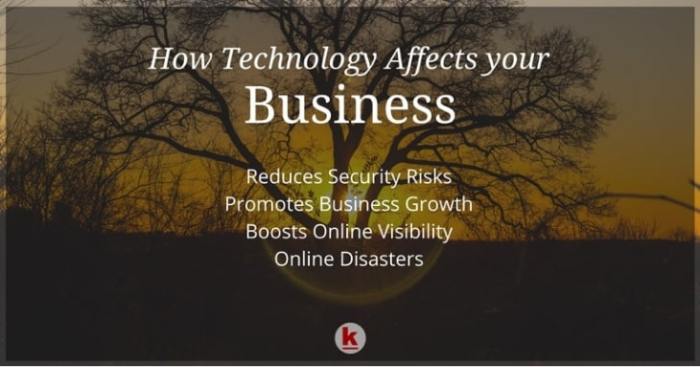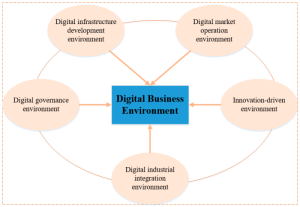
With Impact of technology on business environment at the forefront, get ready to dive into a world where innovation meets opportunity. Brace yourself for a rollercoaster ride of technological advancements shaping the future of business landscapes.
From transforming operations to enhancing productivity, technology is the driving force behind the evolution of how businesses thrive in today’s fast-paced environment.
Impact of technology on business environment
Technology has significantly transformed the way businesses operate in today’s digital age. From streamlining processes to enhancing customer experiences, the impact of technology on the business environment is profound.
Enhanced productivity in various industries
- Automation of repetitive tasks using software and robotics has increased efficiency and reduced human error in manufacturing industries.
- Data analytics tools have enabled businesses in the finance sector to make informed decisions based on real-time insights.
- Cloud computing has revolutionized the way businesses in the IT sector store and access data, leading to improved scalability and cost-effectiveness.
Improving communication within organizations
- Collaboration tools such as Slack and Microsoft Teams have facilitated seamless communication among employees, regardless of their physical locations.
- Video conferencing platforms like Zoom have made virtual meetings more interactive and engaging, fostering better team collaboration.
- Email and instant messaging have become essential communication channels for sharing information and updates within organizations.
Influencing customer interactions and experiences
- Personalized marketing campaigns powered by data analytics have allowed businesses to target specific customer segments with relevant offers and messages.
- Chatbots and virtual assistants have improved customer service by providing instant responses to queries and 24/7 support.
- E-commerce platforms have transformed the way customers shop by offering convenience, customization, and a seamless purchasing experience.
Chemicals and Allied Products
The chemicals and allied products industry plays a vital role in the business environment, providing essential materials for various sectors such as manufacturing, agriculture, healthcare, and more.
Impact of Technological Advancements
Technological advancements have revolutionized production processes in the chemicals and allied products industry. Automation, artificial intelligence, and data analytics have optimized manufacturing operations, leading to increased efficiency, reduced waste, and improved product quality.
- Innovative technologies like process simulation software and predictive maintenance tools have enabled companies to streamline their production processes and minimize downtime.
- Robotic process automation (RPA) has enhanced the precision and speed of tasks such as mixing, blending, and packaging, resulting in higher productivity and cost savings.
- Sensor technology and Internet of Things (IoT) devices are being used to monitor environmental conditions, detect potential hazards, and ensure compliance with safety regulations in chemical manufacturing facilities.
Role of Technology in Safety and Compliance
Technology plays a crucial role in ensuring safety and compliance within chemical manufacturing. Advanced monitoring systems, real-time data analysis, and remote operation capabilities help companies maintain a secure working environment and adhere to regulatory standards.
- Automated safety systems, such as gas detection sensors and emergency shutdown mechanisms, protect workers from potential hazards and prevent accidents in chemical plants.
- Regulatory compliance software enables companies to track and report on environmental impact, chemical usage, and waste management practices, ensuring adherence to government regulations and industry standards.
Examples of Innovative Technologies
The chemicals and allied products sector is embracing cutting-edge technologies to drive innovation and stay competitive in the market.
- 3D printing technology is revolutionizing the production of custom-designed chemicals and materials, offering flexibility and efficiency in manufacturing processes.
- Nanotechnology is being used to develop advanced materials with unique properties, opening up new possibilities for applications in various industries.
- Blockchain technology is enhancing supply chain transparency and traceability, enabling companies to track the origin and quality of raw materials throughout the production cycle.
Construction and Maintenance

Technology has significantly transformed the construction and maintenance industries, revolutionizing practices and boosting efficiency across various projects. From automation to robotics, the impact of technology is evident in every aspect of construction and maintenance operations.
Automation and Robotics in Construction
- Automation and robotics have streamlined construction processes, leading to increased productivity and precision.
- Robots are now being used for tasks such as bricklaying, welding, and even demolition, reducing the risk of human error and enhancing safety on construction sites.
- Advanced technologies like drones and 3D printing are also being incorporated into construction projects, allowing for faster completion times and cost savings.
Impact of Technology on Sustainability
- Technology has played a crucial role in promoting sustainability and green building practices in the construction industry.
- Smart building materials and energy-efficient systems are being integrated into construction projects to reduce environmental impact and energy consumption.
- Digital tools such as Building Information Modeling (BIM) are being used to optimize building designs for energy efficiency and sustainability.
Digital Tools for Maintenance Operations
- Maintenance operations across industries are benefiting from the use of digital tools such as Computerized Maintenance Management Systems (CMMS) and Internet of Things (IoT) devices.
- These tools enable predictive maintenance, allowing businesses to anticipate equipment failures and schedule maintenance proactively, reducing downtime and costs.
- Augmented Reality (AR) and Virtual Reality (VR) technologies are also being utilized for training maintenance technicians and troubleshooting complex systems.
Consumer Goods and Services

Technology has revolutionized the way consumer goods are produced, marketed, and consumed in today’s business landscape. With the advent of e-commerce platforms and data analytics, businesses have been able to tailor their products and services to meet the evolving demands of consumers. Let’s delve deeper into the impact of technology on consumer goods and services.
Role of E-commerce Platforms
E-commerce platforms have played a pivotal role in transforming consumer shopping behaviors. These platforms have provided consumers with convenience, variety, and accessibility like never before. With just a few clicks, consumers can browse through a wide range of products, compare prices, read reviews, and make purchases from the comfort of their homes. This has not only changed the way consumers shop but has also opened up new avenues for businesses to reach a global audience.
Use of Data Analytics
Data analytics has become a game-changer in understanding consumer preferences and trends. By analyzing vast amounts of data collected from various sources such as social media, online searches, and purchase histories, businesses can gain valuable insights into what drives consumer behavior. This data-driven approach enables businesses to personalize their marketing strategies, product offerings, and customer experiences, ultimately leading to higher customer satisfaction and loyalty.
Personalized Consumer Experience
Technology has enabled businesses to personalize the consumer experience across various sectors. For example, in the fashion industry, virtual fitting rooms and personalized recommendations based on past purchases have enhanced the shopping experience for customers. Similarly, in the food and beverage industry, mobile apps that offer customized menus and loyalty rewards have helped businesses connect with their customers on a more personal level.
Overall, technology has empowered businesses to create tailored experiences that resonate with individual consumer preferences and tastes.
Business Energy
Energy management plays a crucial role in the modern business environment as companies strive to reduce costs, increase efficiency, and minimize their environmental impact. Technology has been instrumental in optimizing energy consumption and helping businesses achieve these goals.
Importance of Energy Management
In today’s competitive market, businesses are constantly looking for ways to cut costs and improve their bottom line. Energy expenses can make up a significant portion of a company’s operating budget, so effective energy management is essential for financial sustainability. By implementing energy-efficient technologies and strategies, businesses can reduce their energy consumption, lower their utility bills, and ultimately increase their profitability.
Role of Renewable Energy Sources
Renewable energy sources, such as solar, wind, and hydroelectric power, are playing an increasingly important role in shaping the energy landscape for businesses. These sustainable sources of energy not only help companies reduce their carbon footprint but also provide a reliable and cost-effective alternative to traditional fossil fuels. By investing in renewable energy solutions, businesses can enhance their sustainability efforts and contribute to a greener future.
Smart Energy Solutions in Different Industries
- Smart Grid Technology: The implementation of smart grid technology enables businesses to monitor and manage their energy usage in real-time, optimizing energy distribution and reducing wastage.
- Energy-Efficient Lighting Systems: Many industries are upgrading to energy-efficient lighting systems, such as LED lights, to reduce electricity consumption and maintenance costs.
- Energy Management Software: Businesses are utilizing energy management software to track and analyze their energy usage data, identify areas for improvement, and implement energy-saving measures effectively.
- On-Site Renewable Energy Generation: Some industries are investing in on-site renewable energy generation, such as solar panels or wind turbines, to reduce their reliance on grid power and lower energy costs in the long run.
Business Environment
The business environment refers to the external factors that affect the operations and success of a business. This includes factors such as economic conditions, market trends, competition, legal and regulatory requirements, and technological advancements.
Regulatory Compliance and Risk Management
Technology has greatly impacted regulatory compliance and risk management within the business environment. With the use of advanced software and analytics tools, businesses are able to ensure compliance with regulations and identify potential risks more effectively. Automation of compliance processes has also helped in reducing errors and streamlining operations.
- Implementation of blockchain technology for secure and transparent transactions.
- Use of artificial intelligence for real-time risk assessment and mitigation strategies.
- Integration of cloud-based solutions for data storage and regulatory reporting.
Innovation and Entrepreneurship
Technology plays a crucial role in fostering innovation and entrepreneurship in the business ecosystem. By providing access to digital platforms, tools, and resources, technology enables entrepreneurs to bring their ideas to life and reach a wider audience. The ease of communication and collaboration offered by technology has also accelerated the pace of innovation in various industries.
- Development of mobile applications for new business ventures.
- Utilization of virtual reality for product design and testing.
- Adoption of data analytics for market research and consumer insights.
Future Trends of Technology Integration
The future trends of technology integration in the evolving business environment point towards even greater reliance on digital solutions and automation. As businesses strive to stay competitive and meet the changing demands of consumers, technologies such as artificial intelligence, Internet of Things, and 5G connectivity will play a crucial role in transforming the way businesses operate.
- Expansion of predictive analytics for personalized customer experiences.
- Integration of robotics and automation in manufacturing processes.
- Adoption of sustainable technologies for environmental conservation and corporate social responsibility.
Closing Notes
As we conclude this journey through the impact of technology on the business environment, remember that embracing technological change is not just an option but a necessity for staying competitive and relevant in the ever-evolving market. The future belongs to those who innovate and adapt, so gear up for the exciting possibilities that lie ahead!
Answers to Common Questions
How has technology revolutionized communication within organizations?
Technology has introduced tools like video conferencing, instant messaging, and collaboration platforms that have streamlined communication processes and improved efficiency within organizations.
What are some examples of innovative technologies in the chemicals and allied products sector?
Examples include automated production lines, AI-driven quality control systems, and IoT devices for monitoring chemical processes in real-time.
How does technology personalize consumer experiences in different sectors?
Technology enables businesses to collect and analyze customer data to offer personalized recommendations, targeted promotions, and tailored shopping experiences based on individual preferences.
What role does renewable energy play in shaping the energy landscape for businesses?
Renewable energy sources like solar and wind power offer sustainable alternatives that help businesses reduce their carbon footprint, lower energy costs, and contribute to a greener environment.
How is technology fostering innovation and entrepreneurship in the business ecosystem?
Technology provides tools for startups and established businesses to innovate, create new products/services, reach wider audiences through digital platforms, and adapt to changing market demands swiftly.





